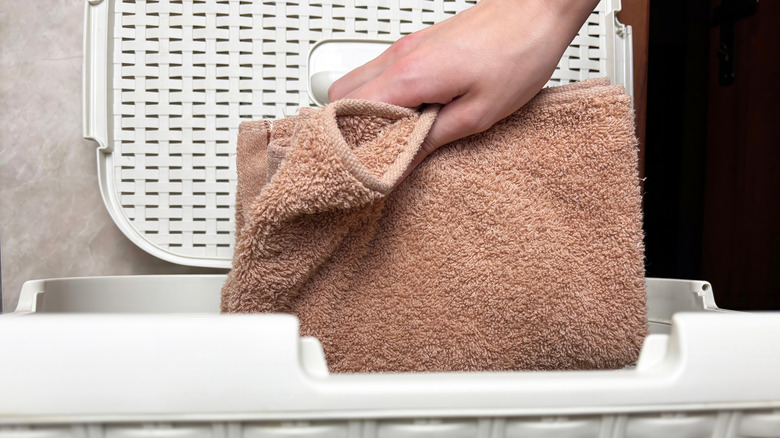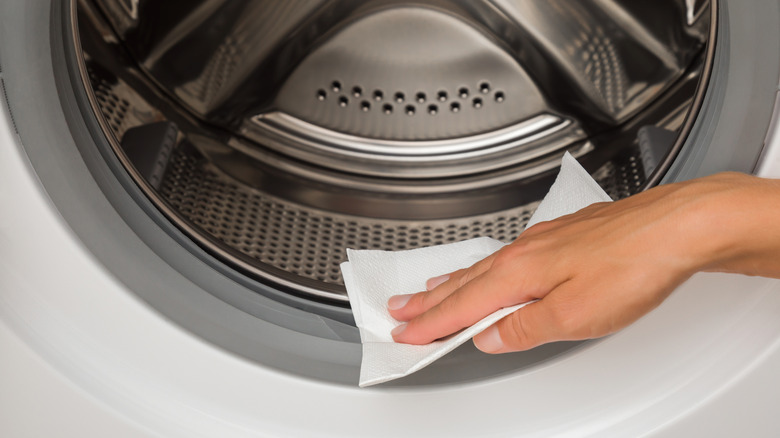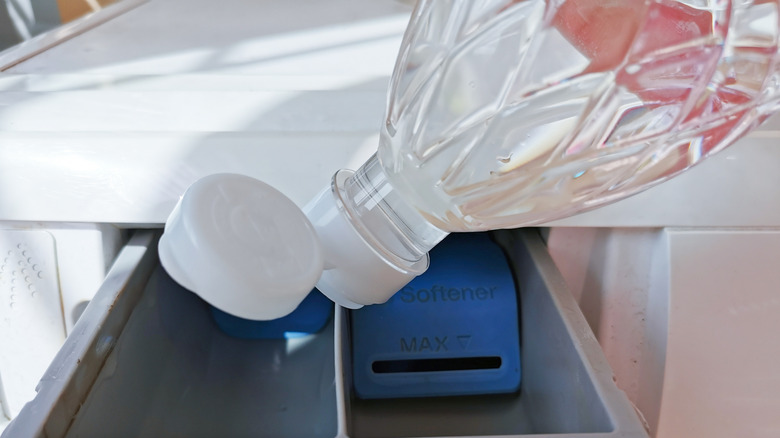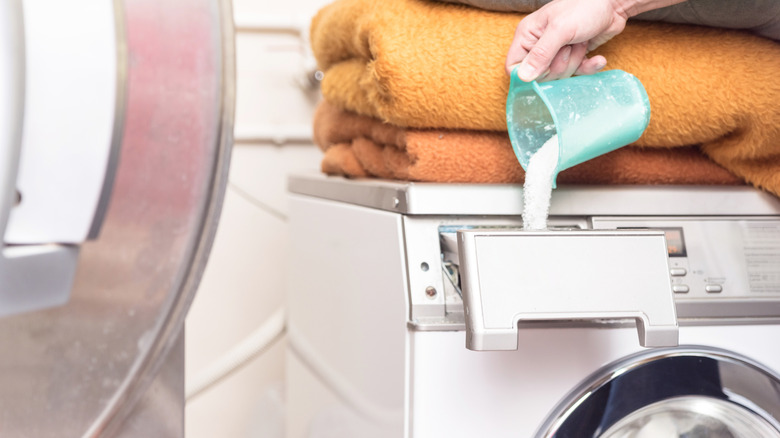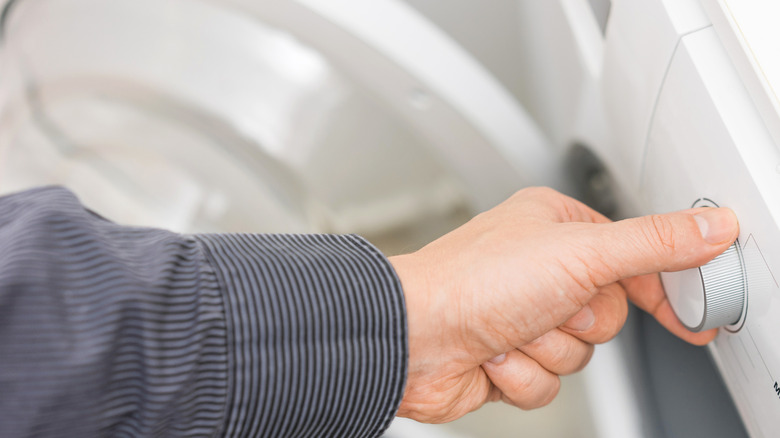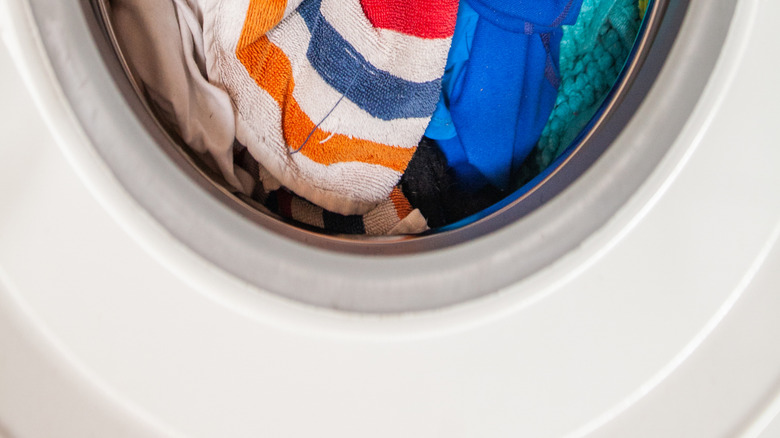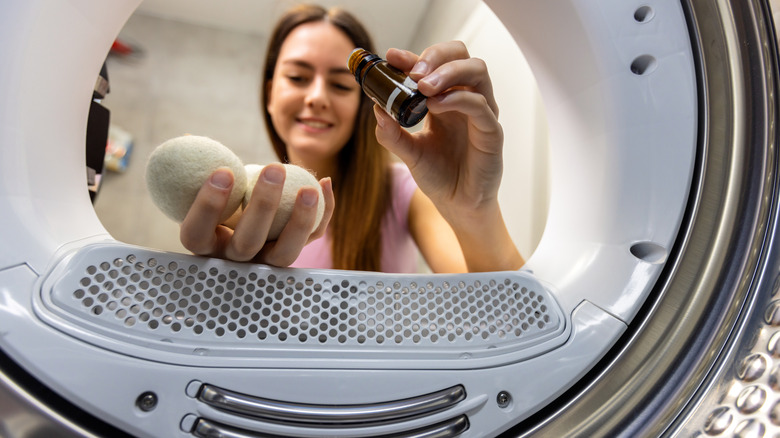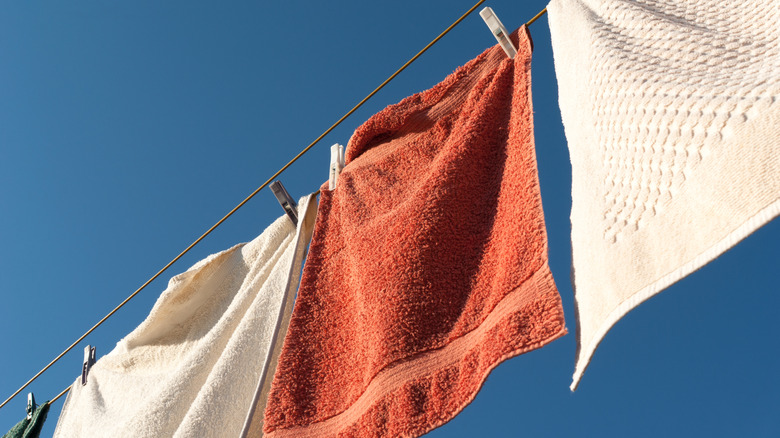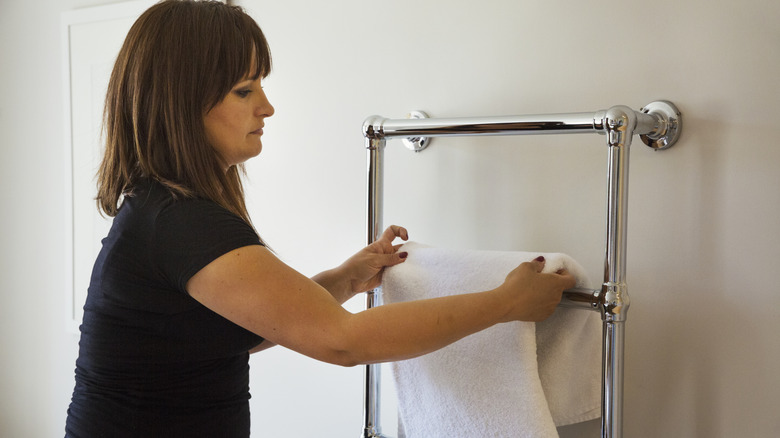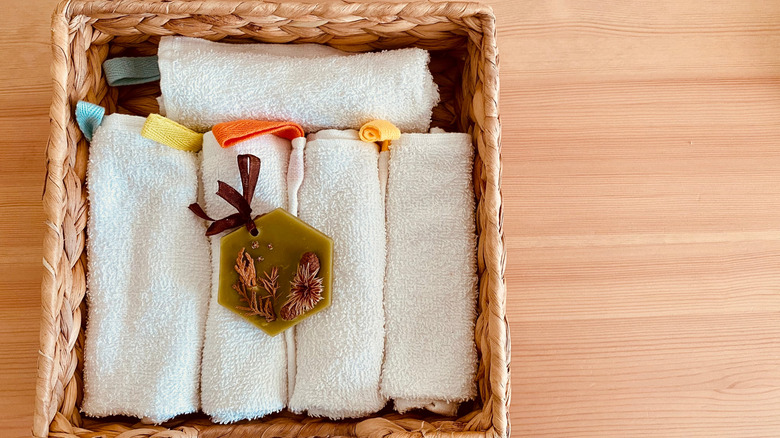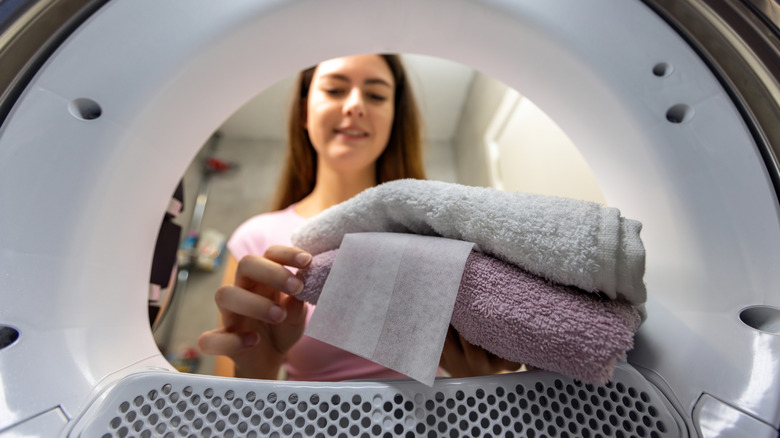16 Ways To Get (And Keep) Towels Smelling Fresh And Clean
We may receive a commission on purchases made from links.
Is there anything less welcoming after a shower than wrapping yourself in a dank, musty towel? For that matter, the smell of less-than-fresh hand towels can make walking into your powder room an impressive experience. And don't even get us started on pulling last year's dank beach towels out of the recesses of the linen closet! Sometimes, no matter how hard we try to keep towels clean, they just don't seem to retain their freshness. And there may be times when they don't even come out of the dryer smelling much cleaner than when they went into the washing machine.
A number of factors influence why towels either don't come out of the laundry smelling fresh or just don't seem to retain that freshness for very long. The biggest culprits include low-temperature washing and drying, improperly storing the towels, and even mildew-ridden laundering equipment. To combat musty, smelly towels, take a look at how you launder, store, and handle your towels.
Choose the right towel material
Bath towels can be made from various materials and differing manufacturing processes. These factors affect how long towels take to dry. While many love drying off with fluffy towels boasting a high thread count, those types tend to stay damp longer. Often, the thicker the towel, the higher the number of bacteria that can fester there. That's why taking the time to choose the best material for your bathroom towels can really pay off when it comes to odor reduction.
Towel options that dry better and may be more resistant to odor-causing problems like mildew include bamboo, organic cotton, hemp, or microfiber. The good news? Towel technology is getting better all the time, allowing for manufacturing methods that combine comfort with quick absorption. The Good Housekeeping Lab, for example, recommends towel options such as waffle-weave bath towels or ones that combine a microfiber interior with a soft cotton surface.
Avoid throwing wet towels in the hamper
Most of us are guilty of simply tossing damp, smelly towels in the hamper, trusting that laundry day will magically renew their freshness. The problem? That moisture not only creates a smelly hamper, but it also makes it harder to clean the towels once they do go in the wash. In fact, letting damp clothes or towels linger in the hamper increases the chance of mildew spores growing on these textiles.
The solution is simple. Allow each towel to dry out before you put it in the hamper, either on the towel bar or the shower curtain rod. This will keep those mildew spores from gaining a foothold on the towels before they have a chance to be sanitized in the laundry. If you do discover the dreaded signs of mildew, take the towel outside and brush the surface spots off the towel. If anything remains, mix lemon juice and salt to form a paste, spread it on the areas, and leave it out to dry in the sun for a few hours before laundering it.
Clean the machines
Your washing machine and dryer can get smelly, too, resulting in towels and other laundry that smell less-than-fresh, even after a wash. That's because the dirt, grease, mildew, mineral deposits from water, and other laundry debris can get trapped in the machines themselves. Always start by checking the manufacturer's instructions for how to clean your machines and how often it should be done.
Vinegar and baking soda are low-cost ways to keep those machines fresh. For front-loading washing machines, wipe the gasket with a cloth soaked in white vinegar. Then, run a cycle on hot water with 2 cups of vinegar poured into the detergent dispenser, followed by a cycle of hot water with ½ cup of baking soda poured directly into the machine itself. For a top loader, let the machine fill with hot water and 4 cups of white vinegar, and soak for an hour. Restart the machine, and run a second hot water cycle after adding a cup of baking soda.
Your dryer's cleanliness is also important. If it's not running properly, it won't remove all of the moisture from towels. It can also trap musty scents in its drum. Make sure to clean the lint trap regularly and inspect the vent for any buildup or loose ductwork.
Wash towels more often
Do you ever wonder how often you should be cleaning your bathroom towels? Well, studies confirm the (perhaps obvious) fact that unwashed towels tend to lose freshness with each successive use. So, the American Cleaning Institute suggests washing bath towels after three to five uses.
The longer that damp towels linger in a humid bathroom, the quicker they are to host those smelly mold spores, along with bacteria and other undesirables. Of course, having a well-stocked linen closet means that you don't necessarily have to be constantly laundering bath and hand towels simply to retain freshness. Instead, replace them with fresh ones once or twice a week, as needed. During humid weather, replace spent towels with clean ones more often.
Use vinegar for a fresher scent
There's a simple kitchen ingredient that can soften your towels and keep them smelling fresh at the same time. Adding white vinegar to the washing machine during a towel load helps remove odors, keeping bad smells neutralized longer. White vinegar also acts as a valuable replacement for commercial fabric softeners or dryer sheets, leading to its reputation for helping to soften towels. Products like fabric softener can also coat the fibers of towels, preventing them from properly absorbing moisture.
To harness the freshening properties of white vinegar, launder towels as you normally would, using your preferred detergent. Add about ½ cup of white vinegar during the rinse cycle. But what if your unwashed towels are especially smelly? Laundry expert Maria Mooney suggests an extra step beforehand. "Soak items in distilled white vinegar for three minutes before adding them to your washing machine," Mooney advises to Martha Stewart.
One big caveat: Check your owner's manual before using vinegar to clean either towels or the machines themselves. In some cases, the gaskets may react poorly to the vinegar. In that case, opt for other methods outlined here, and skip the vinegar.
Try baking soda to fight odors and hard water
There's another pantry staple that can come to your aid in the laundry room. Baking soda can banish unpleasant laundry odors and can be added to detergent when washing towels. Like vinegar, baking soda is a natural, cost-effective ingredient that helps keep towels fresher, longer. Baking soda really shines when it comes to fighting perspiration and chemical fragrances. Those properties make it especially powerful for sweaty, smelly gym towels, as well as new towels that still have a perfumed scent.
To use baking soda in the washing machine, add up to 1 cup to the load, then launder as you normally would. Baking soda is also useful as a laundry booster for people who are contending with hard water. Hard water not only leaves towels more scratchy, but also makes it more difficult to remove dirty substances from the towels themselves. Along with its natural odor-busting properties, baking soda helps laundry detergent contend with the freshness-busting challenges that hard water poses.
Consider a laundry booster
Are you wondering if you need a laundry detergent booster? If you just can't seem to get towels to smell very fresh, no matter how carefully you wash and store them, that might be a sign that you should consider a quality booster. These products are designed to remove odors that come with special issues in the house that can permeate laundry, such as smoke, mildew, or pet accidents. As the name suggests, laundry detergent booster products don't replace your favorite laundry detergent, but rather work with your detergent to heighten the detergent's natural cleaning powers.
There are special products on the market to boost the power of your laundry detergent, or you can use simpler, one-ingredient solutions such as Borax (sodium borate). If you go this route, add up to 1 cup of Borax to your regular laundry detergent to enhance freshness when washing towels. For other laundry booster products, follow the manufacturer's directions. In general, you'll add them to your regular detergent just before washing.
Wash towels in hot water
The advent of cold-water detergents in the supermarket is undeniably helpful in many laundering situations. Cold water laundering uses less electricity, after all, making it a "greener" solution. But towels often represent a special laundry challenge, because their dampness and bare-skin contact make them a potential breeding ground for bacteria and mildew that require heat in order to be destroyed. To restore towels to peak freshness, using the hottest setting on your washing machine is crucial for removing the factors that lead to smelly towels.
Ideally, your washing machine should reach temperatures between 104 and 140 degrees Fahrenheit in order to destroy pathogens. After checking labels to ensure your towels don't have special cleaning instructions, wash them at the highest temperature possible. This practice is especially helpful for towels that are about to go into long-term storage, such as beach towels. Laundering at high temperatures can help stored towels retain freshness when you pull them out next summer.
Give those towels an extra spin
Coming out of the laundry room clean but still damp is a common cause of towels "turning" more quickly after a couple of uses, or never smelling fresh in the first place. One method for preventing that is making sure they don't go into the dryer sopping wet. If you haven't been utilizing all of your washing machine's components, now is the time to take them for a spin — literally!
Along with opting for a high-temperature wash cycle, choose one that incorporates more spinning of laundry while in the machine. Look for options labeled "extended spinning" or "high speed spin." These cycles remove as much water as possible from towels before they go into the dryer. And needless to say, don't let them linger too long in the washing machine once they're done. Pop them right in the dryer as soon as you can.
Dry towels at the hottest setting
Drying the towels with heat is also important when it comes to killing the "bad guys" that are the enemy of freshness. Using a high setting helps ensure that odor-causing microbes will be destroyed during laundering. Always wash towels with other towels, so that you can ensure that it's safe to process them at high temperatures in your dryer.
So, opt for the hottest setting that also provides the longest possible drying time. As you begin to remove the towels from the dryer, feel each one carefully to make sure none seem damp. An overly-large load, or a dryer that wasn't set properly, may call for a little extra time in the dryer. Remember that when buying new towels, double-check their care tags to ensure that they are color-fast and non-delicate, so that they can be washed and dried under these high-heat conditions.
Toss in some wool dryer balls
Everything you can do to remove moisture during the towel-drying process is crucial. Wool dryer balls help dry clothes more quickly and efficiently by absorbing moisture in the dryer. They also agitate the clothes for better air circulation. (Your wallet will certainly appreciate the electricity saved by cutting drying time!) Dryer balls are additionally prized for reducing static cling, along with eliminating wrinkles and softening clothes and towels.
Wood dryer balls are natural products made from felted wool, and you'll use about four per cycle. They're also reusable, unlike most dryer sheets. In fact, they can last for up to one thousand loads. The balls can also be sprinkled with a drop or two of fresh-smelling essential oils, like lavender, before tossing them into the dryer. If you're washing for multiple people, make sure those who will use the towels don't have specific skin-contact allergies.
Hang towels on the clothesline the right way
Surprise! You don't always have to use the dryer to remove odor-causing issues from towels. Line-drying can also work wonders, as long as you do it properly. UV rays from sunlight may actually add some disinfectant power to your laundry methods. In fact, one study published in Environmental Chemistry found that the appeal of the fresh scent of towels from a clothesline isn't your imagination. Scientists determined that participants enjoyed the scent of certain carbon compounds created by the sun's UV rays.
Of course, some line-drying methods are better than others when it comes to getting towels to their freshest-smelling state. When possible, wait for a day that isn't too humid. In fact, a breezy and sunny day is ideal for the fastest possible drying time. To help things along, give each towel a brisk shake before hanging it on a sturdy line. Try to hang your clothesline high enough so that you can pin the towel by one end, rather than folding it in half over the line. Needless to say, hurry your towels from the line to the linen closet before evening mist or morning dew undoes all of the sun's hard work.
Choose towel bars over hooks
After you dry off from your shower, make sure your towels get the same consideration. Towels dry best when they're spread out, helping prevent the buildup of those musty smells that are the enemy of freshness. For that reason, towel bars are a better choice than hooks. They simply allow for better overall spreading-out and air circulation. Even when you think you don't have enough space in your bathroom to provide a towel bar for each family member, get creative! Bars can be hung on the back of the bathroom door, on a glass shower door, or on the side of a cabinet. If you run out of wall and door space, options like KES Store's 2-Tier Towel Stand can allow for freestanding storage.
There are other things you can do to prevent mildewed towels, especially in humid weather. After you hang your damp towel on a towel bar, run the exhaust fan in your bathroom. Better yet, start the fan before you get into the shower. Keeping the door open for about half an hour after you spread your towel to dry can also help. The same is true of open windows on sunny days.
Store towels in ventilated areas
Towels begin smelling musty when stored in linen closets or cupboards that stay damp and dark. They can also pick up spores and bad smells when forced to "rub elbows" with dirty laundry. For these reasons, the way you store clean towels is just as important as how they were cleaned in the first place. Using one or more of the following methods helps clean towels stay fresher for longer.
First, don't keep your dirty-clothes hamper in the same closet that holds shelves of clean towels and other linens. If possible, store clean towels in open cupboards that allow airflow. Otherwise, when the closet has a light source, keep a 60- to 100-watt bulb on at all times. This practice will warm up the small space, helping eradicate dampness. You can also keep the closet open as often as possible, or consider installing a cutout in the linen closet that allows air circulation. Finally, consider placing a calcium chloride product made for hanging in closets. Packets, like DampRid Hanging Moisture Absorber, contain crystals that are designed to remove dampness from the air.
Place sachets with your stored towels
Towels smell especially nice if you store them with non-toxic closet fresheners that keep them smelling clean. Among the most time-tested products are cloth or beeswax herbal sachets. You can make them yourself, get them at a craft fair, or find them online, like HomeLLax's Lavender Closet Fresheners. Among the most classic sachets for linen closets are lavender and cedar, but your options are wide open. Pine and peppermint are also known for adding freshness. Like lavender and cedar, these scents also help repel various pests.
If you have an herb garden, by all means, add your home-grown, freshly-dried herbs when creating your sachets. Use simple cloth circles or your favorite linen hankie. Set about ½ cup of dried herbs at the center, and add a complementary essential oil if desired. Then, gather them into a bundle that can be fastened with an elastic band or ribbon. Place at least one sachet per shelf or basket of stored towels.
Give towels a boost before use
Sometimes those "special event towels" sit in the cupboard for a long time between uses, losing their fluff and freshness by the month. Then, before you know it, guests are practically on your doorstep and there's no time to run a new load of laundry! So, freshen those slightly musty towels by running them for a few minutes in the dryer. Add a couple of drops of your favorite essential oil to a dryer ball or a washcloth, and toss it in too.
Of course, this trick can be used for hand towels in your guest bathroom. And don't forget that you can also treat yourself with this method anytime, rather than just freshening up towels for guests. Use the same quick-tumble method if you're hauling out the beach towels for the season or packing up for a rental house vacation.


